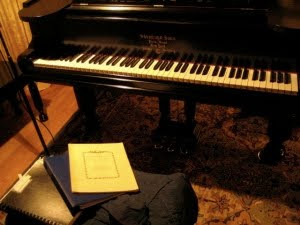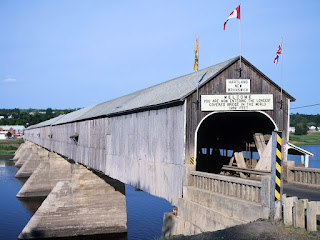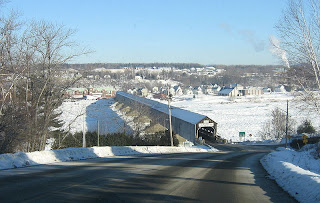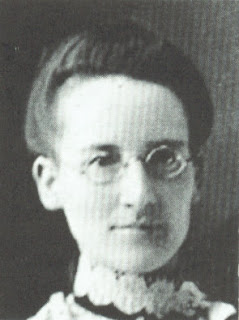Happy summer, everyone!
Wednesday, July 21, 2010
Port Maitland Beach

Stunning in beauty
Fine sand
Summer sun
Walk a mile
and back again
Shifting tableaux
of high clouds and azure sky
or fog on the horizon
Here the ocean
becomes Fundy Bay
Restless waves
or resting, silent sea
Comb the beach
Build a castle
Bring a chair
Read a book
Luxuriate
Fall Asleep
But – note to self:
Don’t go in the water!
40 degrees F?
5 degrees C?
Dunno --
But you’re cold in an instant
Numb in a minute!
Tuesday, July 20, 2010
The Night
I’ve played music a long long time
Collected hundreds of memories
over 56 years
Precious memories
Funny ones
Good friendships
If there are painful memories
I’ve forgotten them already
This is a big big memory:
A milestone
My first foursome
One night only
First year of college
Coffee house
Jesus people
Darkness
Candles maybe
Steinway grand,
Finest keys I ever played
Seemed 20 feet long in the darkness
One Don on bass
Improvising, harmonic, inventive
Another Don drumming
Intuitive, clever, a natural
Doug on Hagstrom guitar
Listening, riffing, complementing
Never before had I played with four
Weren’t we all stunned?
Weren’t we all transfixed?
It felt like magic
It sounded like heaven
or its musical equivalent
Wow!
A door was opened
And we all walked through it
never to return
A beautiful musical moment
A connection
The only night ever
with that particular foursome
The Night.
Monday, July 19, 2010
Hartland: New Brunswick's Smallest Town
It has the longest covered bridge in the world --
twelve hundred and eighty-two feet (390.75 metres)
of pine and spruce.
The bridge was built across the Saint John River in 1901
with major improvements in 1921 and 1945.
You can walk across this “wonder”
on its covered pedestrian walkway.
As a child, we traveled to Hartland
to visit Arthur and Hazel,
my great uncle and aunt.
They lived across the street
from Hatfield’s potato chip factory,
and we bought large brown bags
full of warm, freshly-made chips.
Hartland is located in Carleton County
about 10 miles from the USA
in New Brunswick
Only 1000 people live there,
but Hartland was home
to two recent New Brunswick
Hugh John Fleming (1952-1960)
and Richard Hatfield (1970-1987).
Weirdly, two American congressmen
were also born in Hartland:
Isaac Stephenson (Wisconsin, 1883-1889)
and Samuel Stephenson (Michigan, 1889-1897).
The town website is here.
Friday, July 16, 2010
Capped!
After 86 days of continuous catastrophe,
the hole at the bottom of the sea has been capped.
Oil is not leaking into the Gulf of Mexico
from the Deepwater Horizon location.
Much more remains to be done,
but, at least temporarily, the flow is stopped.
An estimated 689 million liters of oil have flowed into the gulf,
killing wildlife,
damaging the ecosystem
and destroying the livelihoods
of thousands of people.
Thank God!
Perhaps this is the beginning of the end
of this man-made disaster.
Thursday, July 15, 2010
Springhill Mine Disaster
U2 sang about it on their Joshua Tree tour.
The coal mines in Springhill , Nova Scotia
were the site of three mining disasters.
In 1891, a fire killed 125 miners and injured many more.
The scale of this disaster was unprecedented
in Canadian history.
In 1956, an explosion killed 39 men
more than a mile underground.
more than a mile underground.
88 miners were rescued by the heroic work
of draegermen and barefaced miners.
In 1958, a bump (collapsing mineshaft) killed 74 men.
100 miners were rescued,
some of them as late as eight days after the bump.
This last disaster received worldwide attention
in those early days of television newscasts,
and resulted in the mine being permanently closed.
Watch old CBC news clips here.
At least two books were written about the 1958 disaster.
The ballad was written by Peggy Seeger and Ewan MacColl,
who sang it as an a cappella duet. (see the lyrics below)
Peter, Paul and Mary later sang the song.
And the Dubliners after them.
“The Ballad of Springhill”
(Peggy Seeger & Ewan MacColl)
In the town of Springhill , Nova Scotia
Down in the dark of theCumberland
There's blood on the coal and the miners lie
In the roads that never saw sun nor sky. (x2)
In the town ofSpringhill
Often the earth will tremble and roar
When the earth is restless, miners die
Bone and blood is the price of coal. (x2)
In the town of Springhill, Nova Scotia
Late in the year of fifty-eight
Day still comes and the sun still shines
(But it's) Dark as the grave in the Cumberland mine. (x2)
Down at the coal face, miners working
Rattle of the belt and the cutter's blade
Rumble of the rock and the walls closed round
(The) Living and the dead men two miles down. (x2)
Twelve men lay two miles from the pitshaft
Twelve men lay in the dark and sang
Long hot days in the miners tomb
(It was) Three feet high and a hundred long. (x2)
Three days past and the lamps gave out
And Caleb Rushton got up and and said
There’s no more water, or light, or bread
(So we'll) Live on song and hope instead. (x2)
Listen for the shouts of the barefaced miners
Listen thru the rubble for a rescue team
Six hundred feet of coal and slag
Hope imprisoned in a three foot seam. (x2)
Eight days passes and some were rescued
Leaving the dead to lie alone
Thru all their lives they dug their grave
Two miles of earth for a marking stone. (x2)
Down in the dark of the
There's blood on the coal and the miners lie
In the roads that never saw sun nor sky. (x2)
In the town of
Often the earth will tremble and roar
When the earth is restless, miners die
Bone and blood is the price of coal. (x2)
In the town of Springhill, Nova Scotia
Late in the year of fifty-eight
Day still comes and the sun still shines
(But it's) Dark as the grave in the Cumberland mine. (x2)
Down at the coal face, miners working
Rattle of the belt and the cutter's blade
Rumble of the rock and the walls closed round
(The) Living and the dead men two miles down. (x2)
Twelve men lay two miles from the pitshaft
Twelve men lay in the dark and sang
Long hot days in the miners tomb
(It was) Three feet high and a hundred long. (x2)
Three days past and the lamps gave out
And Caleb Rushton got up and and said
There’s no more water, or light, or bread
(So we'll) Live on song and hope instead. (x2)
Listen for the shouts of the barefaced miners
Listen thru the rubble for a rescue team
Six hundred feet of coal and slag
Hope imprisoned in a three foot seam. (x2)
Eight days passes and some were rescued
Leaving the dead to lie alone
Thru all their lives they dug their grave
Two miles of earth for a marking stone. (x2)
Wednesday, July 14, 2010
Meditation
on Psalm 19:7-11
The law of the LORD is perfect, converting the soul:
the testimony of the LORD is sure, making wise the simple.
The statutes of the LORD are right, rejoicing the heart:
the commandment of the LORD is pure, enlightening the eyes.
The fear of the LORD is clean, enduring for ever:
the judgments of the LORD are true and righteous altogether.
More to be desired are they than gold, yea, than much fine gold:
sweeter also than honey and the honeycomb.
Moreover by them is thy servant warned:
and in keeping of them there is great reward.
The law of the LORD is perfect,
converting the soul (Psalm 19:7)
your law, your word, is perfect
fully what you intend it to be
flawless in its nature and quality
true in its essence and totality
correct in its statements
right in its judgement
pure in its motivation
your testimony is sure,
and it affects us when we read it
it touches us when we hear it
it changes us when we meditate on it,
chewing and swallowing and digesting.
it nourishes us
and inevitably it changes us
our souls are converted
we are altered at your altar
what do we need?
we don’t even know
but there is a longing for you
a desire to move with you
to resonate with the tones you’ve produced
to partner with you in the dance
to be with you, in you
to be a part of you
a yearning, an aching sometimes
more to be desired than gold
more to be enjoyed than rubies
sweeter than honey
better than raspberries with ice cream
how good you are!
and I want to love you more
how good is your word,
and I want to love it more!
Monday, July 12, 2010
Acadians
I’m one-sixteenth Acadien.
Acadians are descendents of French colonists
who settled in Atlantic Canada and Maine
in the 17th century.
These hardy pioneers fished and farmed
and mostly got along well
with the First Nations tribes
who already lived in the region –
the Mi’kmaq and Wolastoqiyik
(formerly Micmac and Maliseet).
There was considerable intermarriage.
The French colony of Acadie (Acadia )
comprised the Canadian provinces
of New Brunswick , Nova Scotia
and Prince Edward Island
Most of this region was given to Britain
by the Treaty of Utrecht
The tragic events known collectively
as the Expulsion of the Acadians
occurred from 1755-1763.
The British authorities forced 14,000 Acadians
to leave the region, and many perished.
Longfellow’s poem Evangeline is based on this event.
Some of the survivors traveled to Louisiana
and became known as Cajuns.
Other exiles eventually returned,
most to New Brunswick
where about 325,000 Acadians now live.
Almost all Acadians now speak both French and English.
Acadian culture is rich in history, music and folklore.
Every five years (beginning in 1994),
the Congrès Mondial Acadien
(Acadian World Congress)
meets to celebrate Acadian culture
and address issues relating to Acadian identity.
(In 1999 the congress was held in south Louisiana
but all other years it has been held
in various locations in eastern Canada
Read much more at Wikipedia under the headings:
Acadians
Expulsion of the Acadians
Duke William
Friday, July 9, 2010
Dulse
It’s algae.
And humans eat it.
My mother says she loves it.
It grows on rocks on North Atlantic coastlines.
Harvested by hand or rake.
Dried in the sun.
And it’s good for you.
A good source of minerals and vitamins.
And fiber (or fibre for Canadians).
Salty. Bitter.
(not a great combination in my opinion).
After 50 years of trying,
I still can’t eat more than a small amount
while others eat it by the bagful.
Read the Wikipedia article here.
Buy it from Amazon.com (no kidding!)
(see immediately below)
Thursday, July 8, 2010
Dingle the Beautiful
one of my favorite small towns
breathtaking mountains
hills and valleys
sheep
lots of stones
A pub called The Small Bridge
(“An Droicead Beag”)
button accordion
guitar and bodhran
impromptu dancing
It felt like joy
Breakfast at half eight
Mainstay Guesthouse
granola cereal
granola cereal
French toast
orange juice
Moran’s Slea Head Tour
minibus
Jason our guide
Lord Ventry’s estate
Ogham stones –
ancient Irish writing
beehive huts
fifth century stone igloos
monks lived here
prayed here
beautiful sand
bare feet in the ocean
most beautiful beach
I’ve seen in the world
Jason says “National Geographic
called Dunquin
‘the most beautiful place on earth’”
Far and Away filmed here
Gallarus Oratory –
perfect stone chapel
(seventh century)
in the cow pasture
Delight to walk around town
Fungie the dolphin
free in the harbour
shops
other pubs –
good food, good music
Great place for a two-week holiday
Wednesday, July 7, 2010
On My Father's 86th Birthday
He’s an old man now
Set in his ways
Set in his ways
Vitamin popper
One mile walker
Reader, thinker, preacher
He visits people in that remote Canadian village
Relatives, friends, church folk.
He works on his house
Paints it
Tarred the roof last year
Mows the grass
Mows the grass
Splits firewood
He cares for Mom
Drives her places
Pays the bills
Buys the groceries
He’s an old man now
Once young and vital
Hard-working, thrifty
Conservative but unconventional
No cookie-cutter
He watches every Christian show on TV
Too lenient on his tenants
But Jesus is OK with that, I think
He doesn’t exactly get what I do
And for some reason I still look for his approval,
His blessing, even with grandbabies of my own
What’s up with that?
I feel guilty living 1000 miles away
My sister lives near him
And too much responsibility falls to her
Sorry, sis
It’s great to have a phone plan
That lets me call my folks
Every day if I want
Usually twice a week now
I hope to see him in seventeen days
He’ll be waiting for hugs,
My wife broke down his hug barrier
Thirty years ago
He expects it now.
We’ll take my folks out to dinner
Drive them around
Celebrate the birthdays we missed this year
And the sixtieth wedding anniversary
We’ll talk politics and theology
Walk together in the morning
Maybe chew spruce gum
He may say something important about his estate
Maybe not
We’ll listen to his stories
Treasure ten brief days
He’ll pray for us
Before we get in the car to go
He’s an old man now
A good man
Tuesday, July 6, 2010
Dr. Sun Yat-Sen Classical Chinese Garden
Last night at dinner we were reminiscing
about our vacation in Vancouver , Canada
in July 2005.
One of our good memories is visiting
the Dr. Sun Yat-Sen Classical Chinese Garden
We spent several enjoyable hours there,
in the heart of Vancouver ’s Chinatown .
The beauty and quiet were remarkable,
there in the middle of a bustling city –
ponds, trees, classical Chinese architecture.
You may want to read the Wikipedia article here.
Monday, July 5, 2010
Ella Hadassah Sanders: Heroine
Ella Sanders was one tough lady.
She raised 8 kids on the African frontier for over 20 years.
No household appliances, no internet, no cell phones.
She was a missionary, the wife of a missionary doctor.
The first woman in Canada
In her book “The Communion of Saints,”
my friend Vesta Dunlop Mullen tells the story of Ella (1871-1962)
and her husband Herbert (1869-1941).
my friend Vesta Dunlop Mullen tells the story of Ella (1871-1962)
and her husband Herbert (1869-1941).
Herbert was raised in Port Maitland, Nova Scotia
and Ella moved there with her widowed father
when she was about 14.
when she was about 14.
Herbert’s father was a fisherman, and Ella’s dad a pastor.
As teenagers they were both part of a church youth group
called the “Union Band of Willing Workers.”
Their love for Christ and for one another grew in these years,
and they shared with each other God’s call to foreign missions.
Ella began keeping a journal at 16.
Even then she was full of faith and prayer,
a determined young woman.
She preached and held evangelistic meetings
while still in her teens.
while still in her teens.
Herbert and Ella married in their early 20s
and moved toBrooklyn , New York
and moved to
to attend the Union Missionary Training Institute.
Then Herbert studied at New York City ’s Homeopathic College
Herbert, Ella, and their children sailed to South Africa
After studying Zulu, they moved inland from Durban
preaching and sharing the love of Jesus.
There were many adventures.
They faced opposition from white Afrikaans farmers.
Once the family survived a frightening storm of wind, rain and hail, protected only by the tent in which they were then living.
This intrepid couple established preaching points, new churches,
and eventually two mission stations:
Hartland in Natal and Altona in Transvaal .
Their life’s work was focused in eastern and northern South Africa
Herbert and Ella were missionary pioneers.
They blazed a trail followed later by their children
(most of whom also became missionaries),
and by other Christian workers.
Returning to Canada
Herbert and Ella spent another ten years in pastoral ministry
in New Brunswick and Nova Scotia
At 90, Ella wrote, “…I am still busy trying to fill up the remaining time of my life in winning souls for Jesus and helping others.”
God grant that Ella’s love for Christ and indomitable spirit will infect many other young men and women in this 21st century!
Friday, July 2, 2010
Beulah Camp
Beulah Camp begins today.
Ten days of “holy conferencing”
on 85 magnificent acres
overlooking New Brunswick ’s beautiful Saint John River
in eastern Canada
Worshiping, learning, swimming, walking, visiting.
That’s what goes on here.
Started in 1894 by the fledgling Reformed Baptist Church
(now the Atlantic District of The Wesleyan Church
it was originally reached by riverboat, train and highway.
The district encompasses
all four Maritime provinces
and the state of Maine
so its churches are far-flung.
Friends gather year by year
Friends gather year by year
and decade by decade,
building lifelong friendships
based on ten days of togetherness each year.
Within the past 30 years, a nearby island of 120 acres
(Caton’s Island ) has been purchased.
Children’s and youth camps are held here all summer long.
Over 350 cottages, dorms and RV sites cover the campground,
but it is dominated by The Tabernacle,
a wooden wonder of architectural art built in 1897.
The Tabernacle seats about 1500 persons.
On Sundays as many as 3000 persons may be on the grounds.
but they are mostly gone now.
Beulah remains, probably Canada
As a boy, Beulah marked the beginning and end of each year.
I played with friends, swam with friends, fought,
went to Bible school on weekday mornings.
As a teen, I dated girls there.
A date almost always meant an evening walk
along Beulah’s roads and pathways.
At 18, I experienced God at Beulah
in a way that transformed my life.
in a way that transformed my life.
At 26, I was ordained to the Christian ministry at Beulah.
My father was one of the elders who consecrated me
by the laying on of hands.
He hugged me and said, “I love you.”
Beulah has become a “sacred place”
where God has met thousands.
Lives have been upended
and yielded to the service of the Master.
God, do it again this year!
Thursday, July 1, 2010
Happy Canada Day!
Happy birthday, Canada
On July 1, 1867, the four British colonies of Ontario, Quebec, New Brunswick and Nova Scotia came together to form the Dominion of Canada.
(The word “dominion” is taken from Psalm 72:8 – “He shall have dominion from sea to sea and from the rivers unto the ends of the earth.”) This holiday was called Dominion Day from 1879 until 1982.
The original four provinces were soon joined by Prince Edward Island , British Columbia and Manitoba Alberta and Saskatchewan were added in 1905, and Newfoundland
My favorite Canada Day was in 2005. I was vacationing in Vancouver with my wife Connie and daughter Shannon. We celebrated with thousands of others (mostly Asian-Canadians) at the waterfront, at the convention centre.
There was a lumberjack show, and the lieutenant-governor swore in about 100 immigrants as new citizens of Canada
I remember what seemed like hundreds of Chinese-Canadian children, celebrating with red maple leaves painted on their cheeks.
At 143 years old, Canada is still a young nation, in some respects still trying to understand its own identity apart from both the United States and Britain
Canadians may be a bit less “rah-rah” patriotic that USAmericans. But most of us are “glad to be” Canadians, “where at least” we know we’re more-or-less free. The words “liberty” and “freedom” are not so bandied about in Canada as they are by patriots in the USA
There will be parades and fireworks here and there. Queen Elizabeth II, our British monarch, is in Ottawa
So here’s to you, Canada
Subscribe to:
Posts (Atom)




















